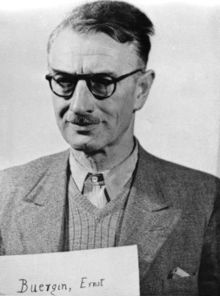Ernst Bürgin

Ernst Bürgin (born July 31, 1885 in Wyhlen ; † June 22, 1966 there ) was a German chemist , head of IG Farben , military economic leader and convicted war criminal .
Life
After attending school in Basel , Bürgin studied chemistry at the University of Basel and in Berlin . After graduating, Bürgin received his doctorate in 1911 with the dissertation “Contributions to the knowledge of the formation of perborates through electrolysis” with Walther Nernst . He then did his one-year military service in Schleswig-Holstein and from 1913 worked as a chemist at Landshof & Meyer in Berlin. Bürgin took part in the First World War as a soldier and was unemployed for two years after the end of the war. He married in 1922 and had four children.
Bürgin worked as an electrochemist for the chemical company Griesheim-Elektron from 1920, headed the plant in Rheinfelden in Baden from 1924 and the Bitterfeld- Süd plant from 1931 . Bürgin became chairman of the Central Germany Operational Association in 1938.
The Nazi Party he joined in 1937 and supported at Carl Krauch in 1936 during the making of the Four Year Plan . From 1938 until the end of the war in 1945, Bürgin was a member of the board of the technical and chemical committee of IG Farben . He was also a member of the Chemicals Economic Group and from 1942 military economic leader . The War Merit Cross (KVK) first class was awarded to him in 1941 and the KVK second class in 1943.
From 1940 Bürgin was entrusted with the technical management of the electrochemical Flixwerke in Spain and was also a member of the local supervisory board. He also took part in the general assembly of Nordisk Lettmetall during the Second World War and thus influenced the Norwegian aluminum business.
After the end of the war, Bürgin was arrested by the US Army in June 1947 and charged with 22 other accused in the IG Farben trial during the Nuremberg trials . On July 30, 1948, he was sentenced to two years imprisonment for "looting and robbery". In the grounds of the judgment, the following was stated about the conviction of Bürgin:
“The defendant Bürgin bears a special responsibility for the crimes committed in Norway . He initiated the plan for the IG to participate in the Norwegian aluminum project and he admitted that the intention was to acquire permanent interests in the Norwegian light metal industry. Bürgin wrote to Schmitz and Ter Meer recommending large-scale participation in the plan to exploit Norwegian resources to promote light metal production for the Air Force . "
literature
- Jens Ulrich Heine: Verstand & Schicksal: The men of IG Farbenindustrie AG (1925–1945) in 161 short biographies. Weinheim, Verlag Chemie, 1990. ISBN 3-527-28144-4 .
- Ernst Klee : The dictionary of persons on the Third Reich . Fischer, Frankfurt am Main 2007. ISBN 978-3-596-16048-8 . (Updated 2nd edition).
- Dirk Hackenholz: The electrochemical works in Bitterfeld 1914-1945 , LIT Verlag Berlin-Hamburg-Münster, 2004, ISBN 978-3-8258-7656-2 .
Web links
Individual evidence
- ↑ a b cf. Ernst Klee: Das Personenlexikon zum Third Reich , Frankfurt am Main 2007, p. 83.
- ↑ Dirk Hackenholz: The electrochemical works in Bitterfeld 1914-1945 , 2004, 197
- ↑ Dirk Hackenholz: The electrochemical works in Bitterfeld 1914–1945 , 2004, 300
- ↑ Dirk Hackenholz: The electrochemical works in Bitterfeld 1914–1945 , 2004, 338
- ↑ From the pronouncement of the verdict in the IG Farben trial. Quoted in: Wollheim Memorial from The verdict in the IG Farben trial. The full text. , Offenbach am Main, Bollwerk 1948, p. 99.
| personal data | |
|---|---|
| SURNAME | Bürgin, Ernst |
| BRIEF DESCRIPTION | German chemist and convicted war criminal |
| DATE OF BIRTH | July 31, 1885 |
| PLACE OF BIRTH | Wyhlen |
| DATE OF DEATH | June 22, 1966 |
| Place of death | Wyhlen |